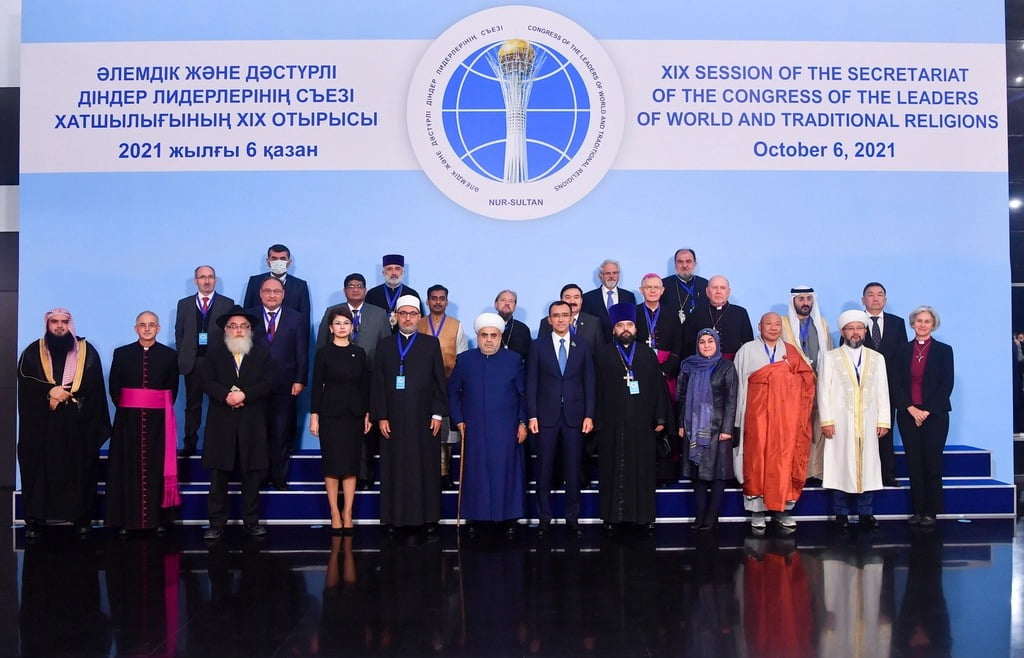Em 13 de fevereiro de 2003, na Conferência Internacional de Paz e Acordo, que desempenhou um papel importante na aproximação de religiões, culturas e civilizações, foi iniciado no Cazaquistão o Congresso de Líderes das Religiões Mundiais e Tradicionais.
O reconhecimento mundial do sucesso e da confiança nas novas iniciativas do Cazaquistão é evidenciado pelo fato de que os chefes dos Estados Unidos, Rússia, França, Itália, Arábia Saudita, Egito, Polônia, Alemanha, chefes de grandes organizações internacionais enviaram suas saudações ao Congresso.
O 1º Congresso de Líderes das Religiões Mundiais e Tradicionais, realizado em setembro de 2003, foi um evento único: pela primeira vez, representantes de todo o mundo religioso se reuniram em uma mesa.
O significado do primeiro Congresso estava em sua ideia conceitual – o diálogo das religiões é uma ferramenta eficaz para resolver disputas e combater o terror. O objetivo do primeiro congresso foi encontrar pontos de referência comuns no mundo para criar uma instituição internacional permanente e garantir o diálogo religioso e a tomada de decisão coordenada.
O 1º Congresso terminou com a adoção de uma declaração na qual os líderes espirituais fizeram declarações sobre ações conjuntas para garantir a harmonia e a estabilidade nas sociedades como base para um mundo harmonioso no futuro. Além disso, decidiu-se realizar regularmente um fórum inter-religioso – uma vez a cada três anos – e criar um órgão permanente de diálogo internacional e inter-religioso – a Secretaria do Congresso. Assim, o Congresso recebeu o potencial de uma plataforma de diálogo de trabalho para a solução de problemas sistêmicos.
O II Congresso de Líderes das Religiões Mundiais e Tradicionais em setembro de 2006, cujo trabalho foi realizado em duas direções: “Liberdade de Religião e Respeito aos Seguidores de Outras Religiões” e “O Papel dos Líderes Religiosos no Fortalecimento da Segurança Internacional”, foi realizado em um novo prédio construído especificamente para este evento – no Palácio da Paz e do Acordo.
Desde o primeiro dia do Congresso, foi adotado o documento “Princípios do Diálogo Inter-religioso”, contendo os principais componentes que orientaram os participantes em seu trabalho. Além disso, foi aprovado um documento final reconhecendo o papel da religião no mundo moderno, que visa fortalecer o papel e a missão dos líderes do mundo e das religiões tradicionais no estabelecimento de uma ordem global.
Os participantes do II Congresso também adotaram uma declaração conjunta convocando representantes de todas as religiões e etnias a prevenir conflitos baseados em diferenças culturais e religiosas.
No centro da discussão do III Congresso de Líderes das Religiões Mundiais e Tradicionais, realizado em julho de 2009, esteve o tema “O papel dos líderes religiosos na construção de um mundo de tolerância, respeito mútuo e cooperação”, onde foram feitas algumas mudanças o formato do congresso. As sessões de discussão tornaram-se inovações neste Congresso.
Ao final do evento, foi aprovado um documento final conjunto, convocando a comunidade mundial a apoiar e promover constantemente os esforços de líderes e organizações religiosas para estabelecer um diálogo inter-religioso frutífero, para ajudar a manter um diálogo de religiões e civilizações.
O resultado do congresso foi a proposta de criação de um Conselho de Dirigentes Religiosos para garantir o diálogo e a cooperação com outras organizações internacionais, cujo trabalho visa o diálogo das culturas e a cooperação econômica.
Por sua vez, em maio de 2012, foi realizado o IV Congresso de Líderes de Religiões Mundiais e Tradicionais “Paz e harmonia como escolha da humanidade”, que enfatizou o importante papel dos líderes religiosos no fortalecimento da segurança da humanidade, melhorando o diálogo e a compreensão mútua.
Uma das iniciativas mais importantes do IV Congresso foi a criação de um recurso da Internet no âmbito de um portal eletrônico único G-Global, dedicado à formação e fortalecimento da tolerância e confiança global.
“Diálogo de líderes religiosos e políticos em prol da paz e do desenvolvimento” foi o tema do V Congresso de Líderes das Religiões Mundiais e Tradicionais em junho de 2015.
Um dos princípios da declaração, formulada pelos participantes do 5º Congresso, baseou-se no apelo das partes em conflitos militares para interromper os confrontos e, por meio de negociações, desenvolver acordos para acabar com a violência e proteger os civis.
Em outubro de 2018, expressando concordância unânime e focando no tema principal do VI Congresso “Líderes Religiosos por um Mundo Seguro”, os participantes discutiram as questões de reaproximação de culturas e civilizações, falaram sobre segurança global e medidas de combate ao extremismo e ao terrorismo.
Os resultados do VI Congresso de Líderes das Religiões Mundiais e Tradicionais mostraram que é necessário alcançar um novo nível de interação. A Declaração dos participantes do Congresso enfatizou que todos os líderes espirituais precisam apelar à comunidade mundial, pessoas, estados com um apelo à paz e segurança.
Para a implementação conjunta das iniciativas expressas, os delegados do VI Congresso apresentaram uma proposta para estabelecer o Centro Nursultan Nazarbayev para o desenvolvimento do diálogo inter-religioso e intercivilizacional.
Em 2021, na XIX reunião da Secretaria do Congresso, foi determinado o tema da próxima VII reunião do Congresso: “O papel dos líderes das confissões mundiais e tradicionais no desenvolvimento socioespiritual da humanidade no pós-pandemia período”, e a data foi aprovada de 14 a 15 de setembro de 2022 em Nur-Sultan.
THE CONGRESS OF LEADERS OF WORLD AND TRADITIONAL RELIGIONS – STAGES OF DEVELOPMENT
On February 13, 2003, at the International Conference of Peace and Harmony, which played an important role in bringing religion, cultures and civilizations closer together, the Congress of Leaders of World and Traditional Religions was initiated in Kazakhstan.
The world recognition of success and confidence in new initiatives of Kazakhstan is evidenced by the fact that the heads of the United States, Russia, France, Italy, Saudi Arabia, Egypt, Poland, Germany, heads of large international organizations sent their greetings to the Congress.
The I Congress of Leaders of World and Traditional Religions, held in September 2003, was a unique event: for the first time, representatives of the entire religious world gathered at one table.
The significance of the first Congress lay in its conceptual idea – the dialogue of religions is an effective tool for resolving disputes and countering terror. The purpose of the first congress was to find common reference points in the world to create a permanent international institution and ensure religious dialogue and coordinated decision-making.
The 1st Congress ended with the adoption of a declaration in which spiritual leaders made statements on joint actions to ensure harmony and stability in societies as the basis for a harmonious world in the future. In addition, the decision was made to hold an interreligious forum on a regular basis – once every three years – and to create a permanent body of international and interfaith dialogue – the Secretariat of the Congress. Thus, the Congress received the potential of a working dialogue platform for solving systemic problems.
The II Congress of Leaders of World and Traditional Religions in September 2006, whose work was carried out in two directions: «Freedom of Religion and Respect for Followers of Other Religions» and «The Role of Religious Leaders in Strengthening International Security», was held in a new building built specifically for this event – at the Palace of Peace and Reconciliation.
From the very first day of the Congress, the document «Principles of Interreligious Dialogue» was adopted, containing the main components that guided the participants in their work. In addition, a final document was adopted recognizing the role of religion in the modern world, which is aimed at strengthening the role and mission of the leaders of world and traditional religions in establishing a global order.
The participants of the II Congress also adopted a joint declaration calling on representatives of all religions and ethnic groups to prevent conflicts based on cultural and religious differences.
In the center of discussion of the III Congress of Leaders of World and Traditional Religions, held in July 2009, was the topic «The role of religious leaders in building a world of tolerance, mutual respect and cooperation», where certain changes were made to the format of the congress. Breakout sessions became innovations at this Congress.
At the end of the event, a final joint document was adopted, calling on the world community to constantly support and promote the efforts of religious leaders and organizations to establish a fruitful interreligious dialogue, to help maintain a dialogue of religions and civilizations.
The outcome of the congress was the proposal to create a Council of Religious Leaders to ensure dialogue and cooperation with other international organizations, whose work is aimed at the dialogue of cultures and economic cooperation.
In turn, the IV Congress of Leaders of World and Traditional Religions «Peace and harmony as the choice of mankind» was held in May 2012, which emphasized the important role of religious leaders in strengthening the security of mankind, improving dialogue and mutual understanding.
One of the most important initiatives of the IV Congress was the creation of an Internet resource within the framework of a single electronic portal G-Global, dedicated to the formation and strengthening of global tolerance and trust.
«Dialogue of religious leaders and politicians for the sake of peace and development» was the theme of the V Congress of Leaders of World and Traditional Religions in June 2015.
One of the principles of the declaration, formulated by the participants of the V Congress, was based on the call of the parties to military conflicts to stop clashes and, through negotiations, develop agreements on ending violence and protecting civilians.
In October 2018, expressing unanimous agreement and focusing on the main theme of the VI Congress «Religious Leaders for a Safe World», the participants discussed the rapprochement of cultures and civilizations, spoke about global security and measures to combat extremism and terrorism.
The results of the VI Congress of Leaders of World and Traditional Religions have shown that it is necessary to reach a new level of interaction. The Declaration of the participants of the Congress emphasized that all spiritual leaders need to appeal to the world community, people, states with an appeal for peace and security.
For the joint implementation of the voiced initiatives, the delegates of the VI Congress put forward a proposal to establish N.Nazarbayev Center for Development of Interfaith and Intercivilization dialogue.
In 2021, at the XIX meeting of the Secretariat of the Congress, the topic of the upcoming VII meeting of the Congress was determined: «The role of leaders of world and traditional faiths in the socio-spiritual development of mankind in the post-pandemic period», and the date was approved September 14-15, 2022 in Nur-Sultan.









